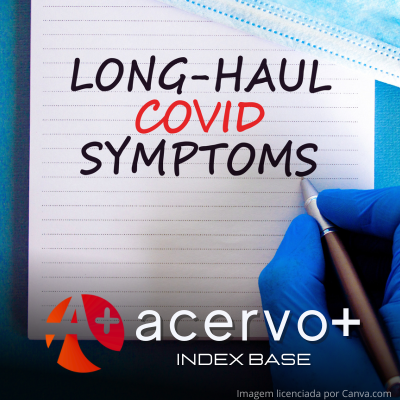Alterações auditivas, cognitivas e vestibulares na síndrome pós-COVID
##plugins.themes.bootstrap3.article.main##
Resumo
Objetivos: Descrever os aspectos clínicos e epidemiológicos relacionados a audição, a cognição e ao equilíbrio de pacientes com síndrome pós-COVID-19. Métodos: Pesquisa analítica transversal com 51 indivíduos, entre 18 e 80 anos, diagnosticados clinicamente e laboratorialmente com COVID-19 nos últimos dois anos. Foram realizados exames audiológicos, testes cognitivos (MOCA e MOCA-B) e exames vestibulares. Resultados: A amostragem foi de 51 indivíduos, sendo predominante o sexo feminino. As manifestações clínicas mais frequentes foram: zumbido (60,8%), hipoacusia (56,9%), alterações na memória a curto prazo (80,4%), na memória de trabalho (68,6%) e vertigem (60,8%). Além disso, 58,1% dos pacientes apresentaram perda auditiva audiometricamente documentada, sendo neurossensorial (88,9%) e grau leve (61,1%) e bilateral (88,9%). Na avaliação da função dos canais semicirculares pelo Video-Head Impulse Test, 66,66% dos resultados foram normais, enquanto 33,3% apresentaram alterações, sendo a hipofunção do canal semicircular posterior direito a mais encontrada (33,33%). Nos testes cognitivos foi observado déficits em linguagem, abstração, função executiva e fluência. Conclusão: Conclui-se que as principais alterações auditivas, cognitivas e vestibulares encontradas em pacientes na síndrome pós-COVID-19 na região Metropolitana de Belém foram a perda auditiva neurossensorial, comprometimento cognitivo leve e hipofunção de canal posterior direito, respectivamente.
##plugins.themes.bootstrap3.article.details##
Copyright © | Todos os direitos reservados.
A revista detém os direitos autorais exclusivos de publicação deste artigo nos termos da lei 9610/98.
Reprodução parcial
É livre o uso de partes do texto, figuras e questionário do artigo, sendo obrigatória a citação dos autores e revista.
Reprodução total
É expressamente proibida, devendo ser autorizada pela revista.
Referências
2. ALIYEVA A, et al. Long-term Follow-up Results of Tinnitus and Dizziness Disorders in Patients after SARS-CoV-2 Infection Based on a Questionnaire. Balkan Medical Journal, 2023; 40(1): 70-71.
3. ALJASSER A, et al. A COVID-19 está associada a sintomas audiovestibulares autorrelatados? International journal of audiology, 2022; 61(10): 832–840.
4. ALVES DE SOUSA F, et al. SARS-CoV-2 e audição: Uma análise audiométrica de pacientes hospitalizados por COVID-19. Journal of otology, 2021; 16(3): 158–164.
5. AUGUSTIN M, et al. Post-COVID syndrome in non-hospitalised patients with COVID-19: a longitudinal prospective cohort study. The Lancet Regional Health. Europe, 2021; 6: 100122.
6. CINAR BC, et al. Cochlear function in adults exposed to severe acute respiratory syndrome Coronavirus 2. Audiology & Neuro-Otology, 2023; 28(3): 169–174.
7. COHEN CBG. A study of the clinical test of sensory interaction and balance. Physical Therapy, 1993; 73(6): 346–351.
8. CRIVELLI L, et al. Changes in cognitive functioning after COVID‐19: A systematic review and meta‐analysis. Alzheimer’s & Dementia: The Journal of the Alzheimer’s Association, 2022; 18(5): 1047–1066.
9. CRIVELLI L, et al. Cognitive consequences of COVID-19: results of a cohort study from South America. Arquivos de Neuro-Psiquiatria, 2022; 80(3): 240–247.
10. DEGEN CV, et al. Self-reported tinnitus and vertigo or dizziness in a cohort of adult Long COVID patients. Frontiers in Neurology, 2022; 13: 1-7.
11. DEL BRUTTO OH, et al. Cognitive sequelae of long COVID may not be permanent: A prospective study. European Journal of Neurology, 2022; 29(4): 1218–1221.
12. EMEKCI T, et al. Evaluation of the efferent auditory system in COVID-19 adult patients. Acta Oto-Laryngologica, 2022; 142(6): 509–514.
13. FERREIRA RJDS, et al. Intensidade e desconforto do zumbido pós-covid-19: um estudo comparativo. Audiology - Communication Research, 2023; 28: 2705.
14. FERREIRA RJDS. et al. Auditory and vestibular symptoms after COVID-19 infection: a preliminary Brazilian report. Revista CEFAC, 2021; 23(6).
15. GALLEGOS M, et al. ¿Qué es el síndrome pos-COVID-19? Definición y actualización. Gaceta Médica de Mexico, 2022; 158(6).
16. GUO J, et al. Vestibular dysfunction leads to cognitive impairments: State of knowledge in the field and clinical perspectives (Review). International Journal of Molecular Medicine, 2024; 53(4).
17. HARTUNG TJ, et al. Fatigue and cognitive impairment after COVID-19: A prospective multicentre study. EClinicalMedicine, 2022; 53: 101651.
18. ISAAC MDL. Do hearing and postural balance influence the life quality Brazilian Journal of Otorhinolaryngology, 2015; 81(2): 117–119.
19. JOHNSON JCS. et al. Hearing and dementia: from ears to brain. Brain: A Journal of Neurology, 2021; 144(2): 391–401.
20. KUMAR S, et al. Neuropsychiatric and Cognitive Sequelae of COVID-19. Frontiers in Psychology, 2021; 12.
21. LANG B, et al. Coronavirus disease 2019 and sudden sensorineural hearing loss. The Journal of Laryngology and Otology, 2020; 134(11): 1026–1028.
22. LIN FR, et al. Hearing loss and cognitive decline in older adults. JAMA Internal Medicine, 2013; 173(4): 293.
23. LITTLE C e COSETTI MK. A narrative review of pharmacologic treatments for COVID‐19: Safety considerations and ototoxicity. The Laryngoscope, 2021; 131(7): 1626–1632.
24. ONG KMC. e CRUZ TLG. Otologic and vestibular symptoms in COVID‐19: A scoping review. World Journal of Otorhinolaryngology-Head and Neck Surgery, 2022; 8(4): 287–296.
25. POFFO C. Avaliação audiológica em adultos pós-COVID-19. Dissertação (Mestrado em Fonoaudiologia) – Centro de Ciências da Saúde. Universidade Federal de Santa Catarina, Santa Catarina; 2023; 44.
26. RASS V, et al. Neurological outcome and quality of life 3 months after COVID‐19: A prospective observational cohort study. European Journal of Neurology, 2021; 28(10): 3348–3359.
27. RÍOS CORONADO OO. et al. Post-COVID-19 syndrome: Audiometric findings in patients with audiological symptoms. International Journal of Environmental Research and Public Health, 2023; 20(17): 6697.
28. SMITH, LJ, et al. Cognition in vestibular disorders: state of the field, challenges, and priorities for the future. Frontiers in Neurology, 2024; 15.
29. TAN M, et al. Effects of Covid-19 on the audio-vestibular system. American Journal of Otolaryngology, 2022; 43(1): 103173.
30. TAVARES-JÚNIOR JWL, et al. COVID-19 associated cognitive impairment: A systematic review. Cortex, 2022; 152: 77–97.
31. WHO. Coronavirus (COVID-19) Dashboard. Coronavirus (COVID-19) Dashboard With Vaccination Data. Disponível em: https ://covid19.who.int/. Acessado em: 11 de dezembro de 2023.
32. YILMAZ O, et al. Assessment of balance after recovery from Covid-19 disease. Auris, Nasus, Larynx, 2022; 49(2): 291–298.
33. YU RC, et al. Adult-onset hearing loss and incident cognitive impairment and dementia – A systematic review and meta-analysis of cohort studies. Ageing Research Reviews, 2024; 98: 102346.
34. ZAUBITZER L, et al. The effects of COVID-19 on the vestibular system. Frontiers in Neurology, 2023; 14.

